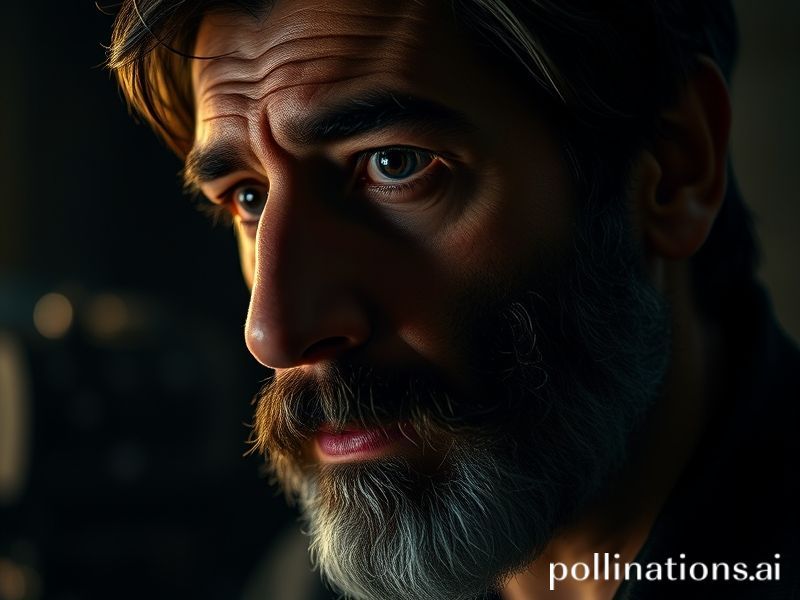Javier Bardem: Spain’s Soft-Power Psychopath and the Global Business of Villainy
Javier Bardem, the Man Who Makes Villainy a Passport
In the grand theatre of international cinema—where the house lights flicker between art and commerce like a power grid in a developing nation—Javier Bardem has quietly become the most reliable export Spain never put on a customs form. While other nations weaponize finance or fossil fuels, Spain dispatches Bardem: six-foot-two of Iberian menace wrapped in a turtleneck, ready to menace your multiplex in seven languages and still have time for tapas.
Consider the geopolitical implications. When No Country for Old Men premiered in 2007, the world had just spent half a decade being lectured about axes of evil and mushroom clouds. Then Bardem’s Anton Chigurh strolled in with a cattle gun and a pageboy haircut, and suddenly global audiences realized the real threat wasn’t uranium but a bad fringe. His performance—Oscar-winning, naturally—became a dark mirror for the post-9/11 West: all moral certainty punctured by one softly-spoken psychopath who flips coins like a bored IMF economist.
The ripple effects were immediate. Tourism boards from Texas to Tamaulipas reported a statistically insignificant uptick in visitors asking where they could purchase compressed-air bolt pistols (answer: you can’t, unless you’re in the market for a very specific kind of cattle). Meanwhile, back in Madrid, the Spanish government quietly added “soft power via psychopath” to its cultural strategy, right between jamón ibérico and flamenco subsidies.
Fast-forward to Skyfall, where Bardem’s Silva turned Bond villainy into a TED Talk on cyber-terrorism and mommy issues. In an era when nation-states outsource espionage to teenagers with Wi-Fi, Silva felt unsettlingly plausible—like Julian Assange with better cheekbones and a small island. Box-office analysts noted the film grossed $1.1 billion worldwide, proving that audiences will pay premium prices to watch Britain’s national myth get hacked by a Spaniard with a bleached bob. Somewhere in Whitehall, a civil servant updated the threat matrix under “Hair: Dangerous.”
But Bardem’s real diplomatic coup is subtler: he weaponizes empathy for the monsters. In Biutiful, he’s a dying Barcelona hustler trafficking counterfeit goods and undocumented migrants—an informal economy foot soldier in Europe’s ongoing austerity pageant. Cannes wept; Brussels pretended not to notice. The film grossed only $24 million globally, but its afterimage lingers longer than any EU trade directive. You exit the cinema suspecting the real criminals wear better suits and sit in nicer offices.
Now, as Hollywood reboots itself more often than a Windows laptop, Bardem has become the go-to chaos agent for every franchise seeking gravitas without subtitles. This summer he’ll torment Dwayne Johnson in a jungle, next winter he’ll probably haunt Paddington Bear in a gritty origin story. Each role expands the empire: Spanish consonants muttered in Dolby Atmos over Singaporean popcorn, Russian pirated torrents, Brazilian subway phones. The man is a one-man Iberian Airbus, delivering existential dread to every continent except Antarctica—though give climate change another decade and he’ll be menacing penguins in a parka.
Critics call it range; cynics call it job security for dialect coaches. Either way, the global economy runs smoother when a Spanish actor can convincingly threaten a British spy while speaking English with a Portuguese accent learned from a Mexican director. Multilateralism at its most absurd.
And so, as the world fractures into algorithmic echo chambers and trade wars fought with microchips, Javier Bardem remains our last functioning multinational: a walking Schengen Area of malice, gliding through customs with nothing to declare except a flicker of human darkness. If civilization collapses tomorrow, archaeologists will find his performances preserved on some server farm, proof that even as the lights went out, humanity still paid to watch itself be terrified by a man who looks like he knows where the bodies are buried—because he’s already auditioning for the sequel.
In the end, perhaps that’s the joke: while governments build walls, Bardem walks straight through them, armed with nothing more lethal than a script and the faint smell of gunpowder aftershave. Globalization may be dying, but the villain who speaks your language—literally—is eternal.







